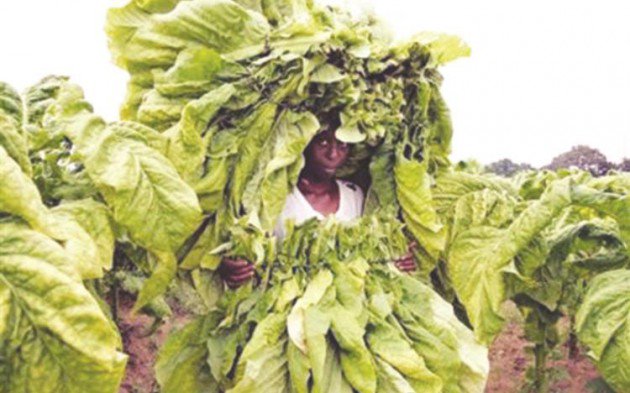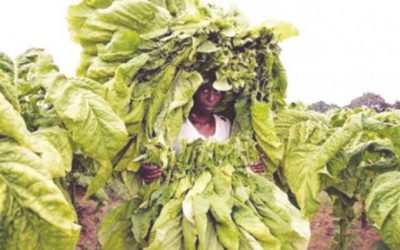Source: Tobacco farming in Zim: A bitter harvest – The Zimbabwe Independent April 13, 2018
The Zimbabwe Independent will this week start serialising a summary of a research report by global human rights organisation Human Rights Watch (HRW) on the tobacco growing sector in the country and attendant problems, particularly rampant human rights abuses and health risks involved. The report was released last week. HRW investigates abuses, exposes the underlying reality, and pressurise those with power to respect rights and secure justice. It is an independent, international organisation that works as part of a vibrant movement to uphold human dignity and advance the cause of human rights for all.
I hope that my children will go back to school, and become better people, because they can’t do that working in tobacco farming. Tobacco growing is a very difficult field. It makes one grow old before their time. — Anne, 36-year-old hired tobacco worker and mother of three child tobacco workers, ages 11, 13 and 15 in December 2016
In November 2017, Robert Mugabe’s 37-year rule of Zimbabwe came to an end on the back of military intervention, and Emmerson Mnangagwa, his former deputy, took office as the country’s new president. In an inauguration address delivered in Harare on November 24 2017, Mnangagwa outlined his plans to help the country’s troubled economy recover, saying: “Our economic policy will be predicated on our agriculture, which is the mainstay.”
He added: “Our quest for economic development must be premised on our timeless goal to establish and sustain a just and equitable society firmly based on our historical, cultural and social experience, as well as on our aspirations for better lives for all our people.”
Tobacco farming is a pillar of Zimbabwe’s economy. Tobacco is the country’s most valuable export commodity — generating US$933,7 million in 2016 — and the crop is particularly significant to Zimbabwean authorities’ efforts to revive the economy.
However, HRW research in 2016 and 2017 into conditions on tobacco farms in Zimbabwe revealed an industry tainted by child labour and confronted by other serious human rights problems as well. Zimbabwean authorities and tobacco companies should take urgent steps to address child labour and other human rights abuses that may be undermining the sector’s contributions to economic growth and improved livelihoods.
In March 2017, HRW met Panashe, a 50-year-old small-scale tobacco farmer in Manicaland, and one of 125 people involved in tobacco production interviewed for this report. Panashe supported his family with earnings from cultivating a half hectare of tobacco. In 2016, he did not make any profit.
“Last year, we had the problem of hail, and we failed to get anything,” he said. Without any earnings from the previous season, Panashe said he was unable to pay workers to help on his farm: “We face the problem of labour. In tobacco, you cannot work alone … I cannot manage to hire workers because I don’t have anything.”
As a result, he relied on help from his 16-year-old daughter and 12-year-old niece.
“They do everything,” he said. “They are overworked.”
Panashe described how he and his wife often felt sick while working in tobacco farming, suffering headaches and dizziness—both symptoms consistent with acute nicotine poisoning, which happens when workers absorb nicotine through their skin while handling tobacco plants.
No one had ever informed Panashe or his family about nicotine poisoning, or how to prevent and treat it, even though he and his wife both suffered symptoms frequently.
“I haven’t ever heard about it,” he said. “I haven’t heard of anyone knowing about this.” He also said he handled pesticides without adequate protective equipment, and sometimes suffered chest pain and blurred vision. “It really does affect us,” he said.
The HRW report — based on extensive field research and interviews with 64 small-scale tobacco farmers like Panashe, as well as 61 hired workers on tobacco farms in the largest tobacco-growing provinces in Zimbabwe — found several serious human rights problems in the tobacco sector. Many children under 18 work in hazardous conditions on tobacco farms in Zimbabwe, often performing tasks that threaten their health and safety or interfere with their education.
Adults involved in tobacco production — both small-scale farmers and hired workers — face serious health and safety risks, but the government and tobacco companies are failing to ensure that workers have sufficient information, training, and equipment to protect themselves.
Hired workers on some large-scale tobacco farms said they were pushed to work excessive hours without overtime compensation, denied their wages, and forced to go weeks or months without pay.
Zimbabwe is among the top tobacco producers in the world. Tobacco production is central to the country’s economy, and tens of thousands of small-scale farmers, and thousands of hired workers on tobacco farms, rely on tobacco cultivation for their livelihoods.
Yet, the government of Zimbabwe is failing to meet its international human rights obligations to protect children’s rights and is also failing to tackle other workers’ rights abuses in the tobacco sector. As Mnangagwa’s administration strives to promote Zimbabwe’s economic growth, authorities should address human abuses faced by the small-scale farmers and hired workers sustaining the tobacco industry.
Tobacco companies also have an important role in respecting human rights in Zimbabwe’s tobacco sector. Many major global tobacco product manufacturers, such as British American Tobacco, and leaf merchant companies like Alliance One International and Universal Leaf Tobacco who supply to other major manufacturers, purchase tobacco in Zimbabwe.
HRW contacted these companies and 28 others regarding human rights concerns in tobacco farming in Zimbabwe and requested information about the policies and systems companies have in place to identify, prevent, and address human rights abuses in their supply chains.
Most companies, including nearly all of the major global tobacco companies, said they have detailed human rights due diligence policies in place and gave overviews of their efforts to conduct training on and monitoring of those policies in Zimbabwe. HRW’s research, however, found that small-scale farmers and hired workers on some large-scale tobacco farms faced abuses that these policies intend to prevent and remedy.
HRW research suggests companies are generally not doing enough to prevent and address human rights abuses throughout the supply chain.
Companies should review their human rights policies to ensure training and communication of standards to all farmers and workers, including in remote areas, using clear, straightforward materials and methods; ensure all workers and farmers are provided written contracts, with labour requirements and protections clearly articulated, and receive copies of these contracts; and that company representatives, especially field staff visiting farms, are adequately trained and held accountable for communicating standards to farmers and workers and implementing human rights policies throughout the supply chain.
Understanding the effectiveness of company policies, implementation, and monitoring is hindered by the fact that none of the companies that HRW contacted for this report have publicly disclosed sufficient and detailed information about how they apply their policies to their supply chain, how they monitor to prevent or address problems, or how they evaluate their efforts to address human rights concerns in their supply chains. Transparency is a crucial element of effective human rights due diligence and facilitates external assessments of the effectiveness of companies’ human rights policies.
With respect to child labour, most tobacco companies that HRW contacted now have policies prohibiting children from performing most tasks in which they have direct contact with green tobacco, a significant step toward protecting children from health hazards such as nicotine poisoning.
However, none of the companies contacted for this report prohibit children from all contact with tobacco, including handling dried tobacco, which HRW research in Zimbabwe and other countries has linked to respiratory symptoms, such as coughing, sneezing, difficulty breathing, or tightness in the chest, and other adverse health impacts on children. HRW calls on all companies and the government of Zimbabwe, to prohibit children from any work involving contact with tobacco, as a policy that is both maximally protective and the most straightforward for companies to communicate, implement, and monitor throughout the supply chain.
Farmers have cultivated tobacco in Zimbabwe for more than a century. Though the volume of production fluctuates from year to year based on economic and political factors and weather, in 2016, the last year for which data is available, Zimbabwe was the world’s sixth-largest producer of tobacco.
Poverty in Zimbabwe is widespread, particularly in rural areas. In 2011, nearly three-quarters of the population lived below the national poverty line. A cash shortage in recent years has crippled the economy, leading the nation’s central bank to impose limits on cash withdrawals and to introduce a form of local currency — bond notes — triggering widespread fears of inflation and further economic deterioration.
The controversial “fast track” land reform programme introduced in 2000 by the ruling party — Zanu PF — has radically altered the nature of tobacco production in Zimbabwe. Under the programme, the government seized thousands of large-scale commercial farms owned by white farmers and redistributed plots of land, including many that were given to landless black Zimbabweans. Since the start of the fast track land reform process, the number of active tobacco growers in Zimbabwe increased dramatically, from around 8 500 growers in 2000, to more than 73 000 in 2016, at least in part due to the government subdividing and redistributing some large farms.
Zimbabwe’s Tobacco Industry and Marketing Board (TIMB) reports that 99 percent of tobacco is grown in one of four provinces: Mashonaland West, Mashonaland Central, Mashonaland East, and Manicaland.
Child Labor in Tobacco Farming
HRW interviewed 14 child tobacco workers, ages 12 to 17, as well as 11 young adults, ages 18 to 22, who started working in tobacco farming as children. In addition, many other interviewees told HRW that children work on tobacco farms in Zimbabwe. More than half of the 64 small-scale farmers interviewed for this report said that children under 18 worked on their tobacco farms — either their own children or family members, or children they hired to work on their farms. About half of the hired adult tobacco workers we interviewed said children under 18 worked with them, either also as hired workers, or informally assisting their parents, who were hired workers.
Primary and secondary school teachers from tobacco-growing regions described to HRW how children’s participation in tobacco farming contributed to absenteeism and made it difficult for their students to keep up with schoolwork.
In all of the provinces where HRW conducted research, regardless of the size of farms or the nature of the work, interviewees explained that children work on tobacco farms in Zimbabwe due to poverty.
Zimbabwean law sets 16 as the minimum age for children to work in any sector and prohibits children under 18 from performing hazardous work. A 2001 amendment to the Children’s Act specifies several types of work that are considered hazardous work for children, including any work, “which is likely to jeopardise or interfere with the education of that child or young person” and any work “involving contact with any hazardous substance, article or process.” However, Zimbabwean law and regulations do not specifically prohibit children from handling tobacco.


COMMENTS
Thousands of hectares and destruction of flora given over to produce the ‘golden leaf’ which is a toxic weed dangerous to the health of people smoking it and bystanders. Has the world gone mad? How can a logical person suck smoke deep into the lungs, smoke that kills and degrades a smoker’s health and bystander’s health and stinks out the clothes, hair, skin and environment?
What a brilliant idea. Let’s not grow food, let’s labour night and day to grow and produce something that is fundamentally bad for humans and congratulate each other on ‘a fine crop’ and how much money we’ve made on producing something that kills people in their tens of thousands or makes them breathless or harms the life of the unborn child.